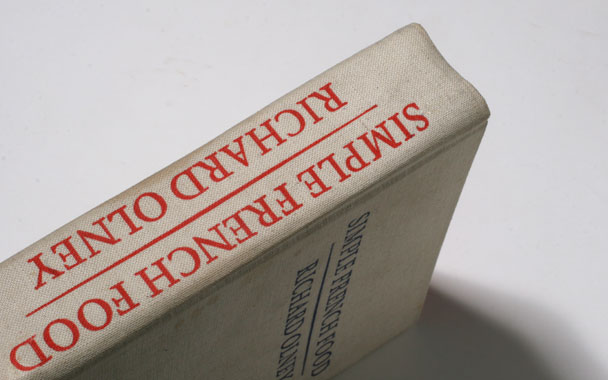Richard Olney was born in Marathon, Iowa, in 1927, and as a young man moved to Paris, and then to Provence, to paint. French food and wine proved a more powerful lure, however, and until he died in 1999, Olney lived the sort of life many of us just dream about: From a small house (complete with hand-hewn wine cellar) perched on a hillside near Toulon, he wrote and masterminded more than 35 books on food and wine, including Time-Life's classic "Good Cook" series. The book that really speaks to me, though, is Simple French Food, published in 1974. I was given a copy by a well-traveled aunt, who always gave wonderful and surprising presents, and a couple of years later, on my first trip to France, the book went with me as culinary Baedeker. Part of my education was the discovery that simplicity can mean perfection or harmony in a dish rather than ease of preparation. It can be hard-won, but it's worth fighting for.
I still find it impossible to open the book without plopping down and reading a chapter or two. Olney's writing is muscular and gorgeous, and his voice—made even more intimate by his own illustrations—remains clear, compelling, and opinionated. He not only looks at food with a painterly eye, he invites the reader into the picture, as well. (Some years ago, when he spoke at Peter Kump's cooking school, a student asked what inspired him. "Pouring a bottle of Burgundy into a copper pot," he said, and the room fell silent.) Another thing about Olney is that he treats cuisine bourgeoise, the honest cooking found in small, unpretentious restaurants and in home kitchens, with great seriousness that never collapses into pomposity. He's too imaginative a cook—and a writer—for that, and his precise yet relaxed recipes coax me to the stove in a way that those of Elizabeth David, to whom he is often compared, never do. (A contemporary writer, by the way, who finds the same sort of joy and, yes, obsession, in chronicling food in America is John Thorne.) In Olney's focus on simplicity, you will also find glamour—the transformation of the ordinary into the extraordinary. Take his vegetable soup with pistou, a condiment that is similar to pesto but without the nuts. In looking at the recipe, you'll note that the soup is extremely adaptable to the contents of your refrigerator and to the season. But you will also see a recipe written by a man passionate about his garden, about his vegetables and herbs. That knowledge somehow becomes distilled in your kitchen, your pot, your hand. You will have never had a vegetable soup like this before.




 Pinterest
Pinterest


